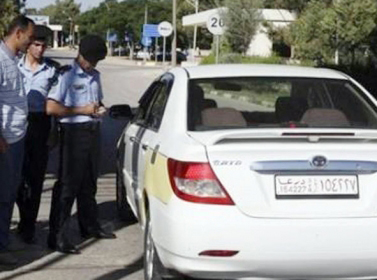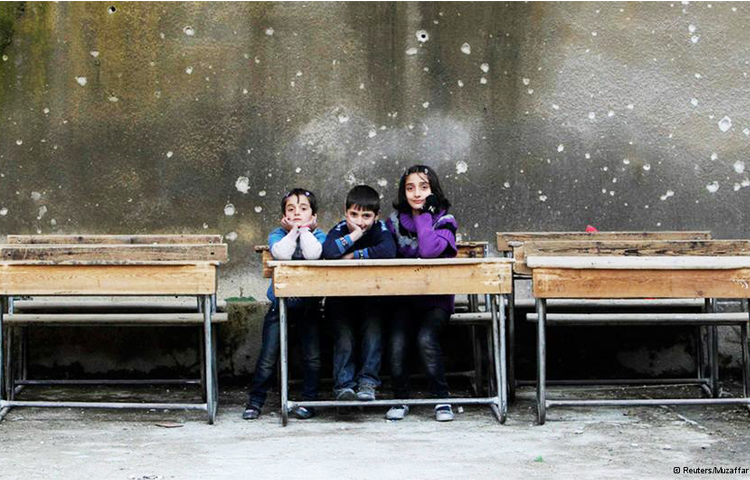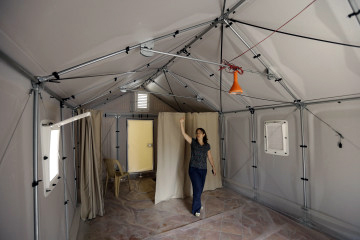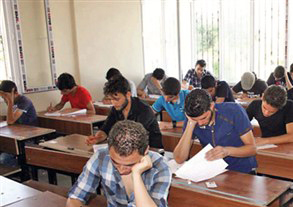
Rights of Syrian Refugees in Jordan, Challenges between Government’s Concerns and Refugees’ Suffering

Enab Baladi Issue # 94 – Sun, Dec. 8, 2013
After over two years and a half of the Syrian crisis, and as the number of Syrian refugees in Jordan increases, the Jordanian government tightens its regulations and passes laws limiting their basic rights as residents on its soil, instead of working towards enhancing their status.
In early November this year, the Jordanian government issued a decree on the evacuation of Syrian cars out of Jordanian soils to add further burdens to the displaced Syrians who have already been deprived of work vacancies according to previously legislated laws that impose 400-dollar fees on Syrians outside Al Za’tari Refugee Camp to receive work permission; whereas refugees are totally deprived of applying to work or to receive work permission.
In Jordan, where about half a million Syrian refugees have resettled, many employers have taken advantage of Syrian employees for their outstanding professional qualities and the low wages they accept to take comparing to the Jordanian citizens. On the other hand, other employers feel sympathy for the Syrian employees because of their harsh situations and bitter living conditions, and therefore they provide them with job opportunities for the benefit shared between the employer and the Syrian citizen; a win-win situation where the employee’s professionalism is rewarded by a fixed yet low wage in return. This phenomenon has not been confined to simple crafts and workshops, but expanded over a number of Jordanian companies.
To obtain a work permit, the Jordanian government charges fees which is an extra burden on the Syrian refugee who cannot afford it. It also costs the employer extra money in order to get his employees the necessary work permits. Consequently, many Syrian refugees found themselves working without an official permit. Therefore, the ministry of labor has distributed a number of inspection patrols affiliated to committees whose mission is to go through the areas where the Syrian employees settle and check on their permits, as well as on Syrian companies. In case the work permit was not obtained, the committees threaten the Syrian employees of ‘legalizing their statuses’ which means deportation. Yet, considering the humanitarian crisis and the continuous insecurity in Syria, the employees get deported to Al Za’tari Camp instead.
Employing Syrian refugees has aggravated the unemployment crisis amongst Jordanians and decreased their job opportunities, given the limitation of such opportunities in most governorates of Jordan. The Jordanian government seems concerned about the social, economic and security consequences of the Syrians roaming on the kingdom without any personal identification. Therefore, it has firmly made sure to apply its work permits-related laws which sometimes impose shops shut down or state particular fees and fines in case of the violation of these laws. Not to forget that several cases of detaining Syrian employees have been recorded.
In a press statement, Dr. Nidal Alaqatamin, the minister of Labor has stated that the final deadline for getting attached to the employer and obtaining the necessary permits is the 11th of the upcoming month, and deportation is the punishment merited for those who violate. Alqatamin also assured that this decision has been made upon the sake of Jordanian citizens, and so they will be provided with the job opportunities taken by the violating Syrians.
It is worth noting that the Jordanian Cabinet has modified the fee system of work permits to non-Jordanians a year ago. According to the latest amendments, the cost of the work permit for the first year has become 400 JOD after it was 300 JOD, while reached to 600 JOD for the second year, and 800 JOD for the third one. According to an official in the ministry of labor, “the security agencies will decisively react against any commercial or industrial establishments that replace Jordanians with Syrian refugee employees. They will also restrict the procedures on employing the unpermitted expatriates especially “Syrians” as the number of Syrian workers who have entered the country was estimated at 160 thousand, including the underage children workers.
The Syrians’ suffers have not stopped at obtaining work permits; the new Jordanian restrictions have reached Syrians’ properties as well. A new resolution has been made by the Jordanian Authority which bans the renewals of Syrians’ cars remaining at the Jordanian soil, and prevents selling them at the free zone. In Turkey, on the contrary, the regulations apply to the Turkish cars get with the Syrian cars in most cases. Moreover, the Turkish government tolerates the procedures of renewing the cars’ entry and registration that is supposed to take place every 6 months.
In conformity with some Syrian opposition’s resource, the number of Syrians’ cars inside Jordan has exceeded 35 thousand cars. As stated in Alwasl, a Jordanian newspaper “so far, no public resolutions have banned the selling or the renewal of Syrians’ cars”. Yet, tens of Syrians have confirmed that this resolution is being implemented in the renewal centers across Jordan where Syrians are used to processing their cars’ renewal documents. Probably what proves this news’ credibility is some recent resolutions made by the government and shared with public four months ago, which have prevented the entry of any Syrian vehicle, except for the ones passing by the Jordanian borders to the Gulf countries.
The Jordanian government justifies these procedures by the reason of reducing the growing traffic crisis in the kingdom, especially that some Syrians use their vehicles for transporting passengers illegally, according to Jordanian newspapers’ reports. These resolutions have been described by many Syrian activists’ pagesas “arbitrary” and “the First fruits of restricting the Syrians’ rights”. Thereupon, many Syrians have rushed to hide their vehicles fearing of deportation or reservation, and waiting for any amendments in this regard, which provide alternatives to deportation.
The Syrians resettled in Jordan have asked the opposition forces for a rapid intervention to help modify such a resolution before a big disaster happens, as described.
It is worth noting that the Jordanian government has issued these resolutions in spite of the large economic profits earned by the Kingdom over the Syrian cars; the Jordanian treasury reaps 700 thousand JOD a month from the Syrians’ cars.
The ministry of interior affairs has issued new instructions requiring an emphasis on documenting the sale of prepaid phone lines for non-Jordanians which has made the Syrians’ life more miserable. These instructions have been published in the Jordanian official newspapers on Sunday, the17th of the current month. They basically assert on keeping private records where the names and addresses of the persons who have purchased the lines are noted down, in addition to a copy of the subscription contract enclosed with the subscriber’s identification.
In its modified instructions, the ministry of interior affairs has emphasized that the points of sale should adhere the resolution, which is not to sell any lines without documentation. The communications commission has earlier asserted that “this strategy is meant to unify the procedures of dealing with non-Jordanians given the increasing numbers of the arrivals to the kingdom especially of Syrian refugees. This will also insure achieving the objectives upon the documentation campaign has been based; that basically are not to misuse the prepaid mobile lines that may cause inconvenience at any social, economic or security level.
اذا كنت تعتقد/تعتقدين أن المقال يحوي معلومات خاطئة أو لديك تفاصيل إضافية أرسل/أرسلي تصحيحًا
إذا كنت تعتقد/تعتقدين أن المقال ينتهك أيًا من المبادئ الأخلاقية أو المعايير المهنية قدم/قدمي شكوى
-
تابعنا على :
















